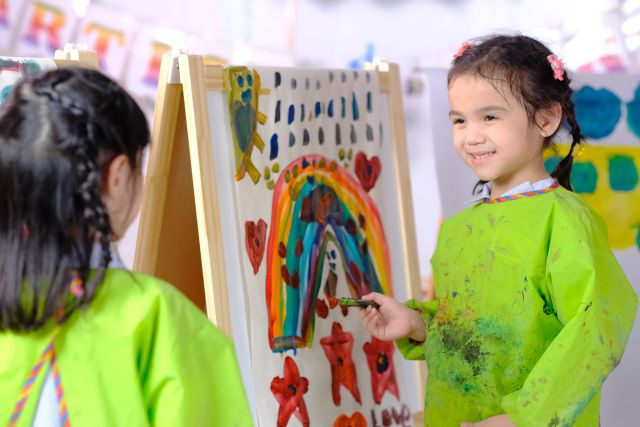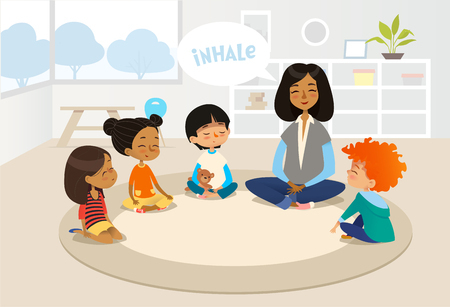When children get reported for bullying or mischief, parents usually face the backlash of not keeping their children’s behaviour in rein. All children with their unique temperaments have the potential to develop good virtues. But how do we nurture good character in kids from young?
⇒ Related Read: My Child, A Bully?
Don’t just teach it. Get them to try it.
The ideas of love, peacefulness, patience, kindness, self-control and empathy may be easy to talk about. However, these concepts may be too broad or vague for children to live out in practical daily life. For example, it may be straightforward to understand patience as waiting for something, but it would also involve not complaining or even accepting “no” for an answer.

Give your child a specific idea of how a certain value can be practised – “Today, can you share your toys with other kids who forgot to bring theirs to school?” or “Can you let other younger kids have their turn at the swing at the playground first?”
⇒ Related Read: Why Turn-Taking Is Better Than Sharing
Be a good role model
Children learn through observation and they love to mirror adults and their mannerisms, sometimes even without the adults knowing. They are quick to pick up phrases and habits. Parents who wish to strengthen altruistic values in their children can join a community service project together or collect canned food and toys for a donation drive. Going through the act itself can allow your children to understand the value of giving and caring by seeing you in action.
⇒ Related Read: Where To Volunteer With Kids In Singapore
Teach life skills
In her book on good character development, Dr Helen Legette notes that basic habits of civility are the pillars of all intellectual and social graces that contribute to a good and just society. How do you disagree without being disagreeable? How do you express your feelings and needs without reacting with impulsivity or violence?
Revisit the topic of good manners with your children and teach them how to respond with kindness in situations that they can’t control.
Show clarity in your values
Take the opportunity to share your stand and your values. Does your child know where you stand on your beliefs and why do you do certain things? Explain why certain choices were made despite the opposing views of their friends and their friends’ parents.
Discuss with them and address these things which are important in your lives. Help the young ones to understand your values and know that there’s a reason why you live by certain choices.
⇒ Related Read: PARENTS: Teaching Positive Values To Children
Set boundaries and teach them to say “no”
Do not give your children any access to alcohol, cigarettes or objectionable material. They should not be within reach or sight. For other aspects such as media exposure or money usage, set reasonable limits for your children.

Explain the allocation of allowances and help them be responsible for money management and appreciation of non-material rewards. Teach discernment in viewing habits and interaction on social media.
⇒ Related Read: How to Be a Better Parent: Keeping Our Children Safe Online
Be In The Know

Know what your children are busy with. Know who their friends are and even their parents. Know what shows they are watching. Where do all their money and time go to? As parents, we need to be engaged and constantly on the lookout for our children.
There are unfavourable and disturbing materials out there and people who seek to manipulate young minds. Remember – you are the parent. The children do not need another cool friend who lets them do what they want. They need someone who will set and enforce appropriate limits for them.
Give meaningful compliments
Marilyn Price-Mitchell, an author and developmental psychologist, notes that praise becomes meaningless unless they learn from it. She suggests that by making praise more specific, it adds value to what the children take away from it, it also allows the parent to show appreciation of who the children are besides what they do.
Give character feedback

Rita and John Sommers-Flanagan, counsellor educators and authors, point out that it is not sufficient just to model. They need praise, encouragement and feedback. When children do wrong, sometimes parents may offer the knee-jerk reaction of negative feedback, “How can you be so terrible?”
The repeated focus on negative behaviour is unhealthy and can cause children to believe and accept that negative notion of themselves. Notice when they do good and amplify good behaviour. “I noticed that you made a point to welcome the new girl in class today, that was very caring of you.”
Let your child take ownership of his/her actions
When a child violates a rule or instruction, then a consequence needs to be rendered for the act. Shielding children from the consequences makes light of personal responsibility.
“When a child chooses to own up to a mistake, recognise it is a precious character-building moment instead of being engulfed by the mistake he/she makes. Be sure to address the mistake but at the same time, encourage noble character,” shared Esther Eio, Associate Lecturer at Ngee Ann Polytechnic in the Early Childhood department.
From a long-term perspective, it is ideal to complement the punishment for the wrongdoing with a discussion on how this could have been better handled.
By Som Yew Ya.
* * * * *
Stay in touch! Subscribe to our Telegram here for all our latest updates.
Like what you see here? Get parenting tips and stories straight to your inbox! Join our mailing list here.



























































Leave a Comment: